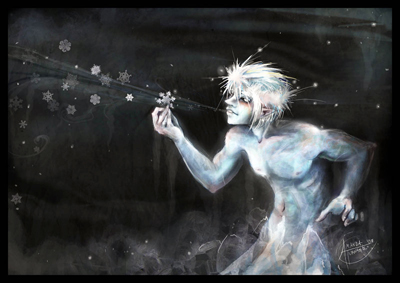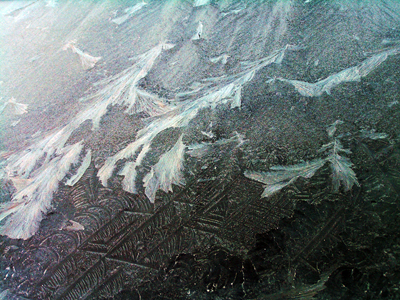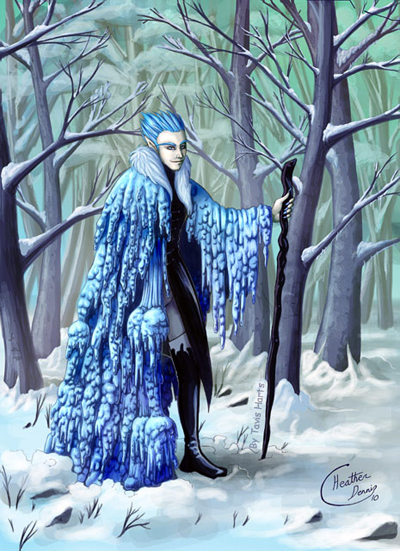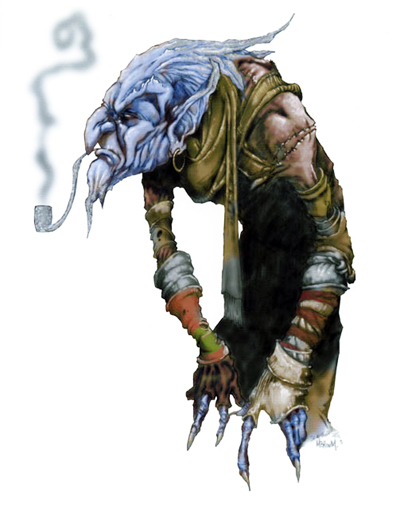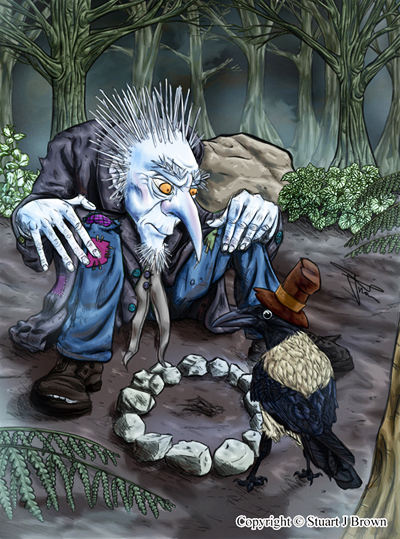Though it guarded the life of a family,
And any woman be there about,
She will die but what she will find it out;
And though it hurried her soul to well
That secret she must immediately tell."
--Sage Stuffing for Young Ducks.
HERE are in Italy, as elsewhere, families to whom a fatality or tradition is attached. The following is a curious legend of the kind :
LA FATTUCHIERA DELLA PORTA ALLA CROCE.
"There was a very old Florentine family which lived in a castle in the country. The elder or head of this family had always one room in which no one was ever allowed to enter. There he passed hours alone every day, and woe to any one who dared disturb him while there. And this had been the case for generations, and no one had ever found out what the secret was. This was, of course, a great vexation to the ladies of the family--perche la donna e sempre churiosa--women being always inquisitive.
"And most inquisitive of all was a niece of the old man, who had got it into her head that the secret was simply a great treasure which she might obtain. Therefore she resolved to consult with a certain witch, who would tell her what it was, and how she could enter the mysterious room. This sorceress lived hard by the Porta alla Croce, for there are always many witches in that quarter.
"The witch, who was a very large tall woman, made the niece go with her to an isolated small house, and thence along a path, the lady in advance. While so doing, the latter turned her head to look behind her, and at that instant heard the cry of a civetta or small owl. The witch exclaimed, 'My dear lady, what you wish for will hardly be granted ; I fear there is a great disaster awaiting you.'
"Then they went into a field, and the fortune-teller produced a goblet of coloured glass, and called to the swallow, which is a bird of good omen, and to the small owl, which forebodes evil, and said, 'Whichever shall alight first on the edge of this cup will be a sign to you of success or failure,'
"But the first which came and sat upon the cup was the owl.
"Then the witch said, 'What there is in that room I cannot reveal, for it disturbs my soul far too much. But I know that the number of that room is thirteen, and you can infer for yourself what that portends ; and more I cannot tell you, save that you should be extremely careful and keep a cheerful heart -- otherwise there is great trouble awaiting you.'
"But the lady returned home in a great rage at her disappointment, and all the more resolved to enter the room. Then all the family finding this out, reproached her, and urged her not to be so distracted ; and she, being obstinate, only became the more determined ; for she was furious that she could not force an old man to reveal a secret which had been handed down for many generations, and which could only be confided to one, or to the eldest, when the old man should die.
"And at last her evil will or mania attained such command over her, that she resolved to kill all the family one by one, till the succession of the secret should come to her. And so, after boiling deadly herbs with care, she made a strong subtle poison. And by this means she put to death her parents, brothers and sisters, aunts and all the family, without remorse, so resolved was she to master the secret.
"The last to perish was her grandfather, and calling her to his bedside he said, 'We have all died by thy hand ; we who never did thee any harm ; and thou hast felt no remorse. This thou didst to gain a treasure, and bitterly wilt thou be disappointed. Thy punishment will begin when thou shalt learn what the thing was so long hidden ; truly there was sorrow enough therein, without the misery which thou hast added to it. That which thou wilt find in the chamber is a skull--the skull of our earliest ancestor, which must always be given to the care of the eldest descendant, and I now give it to thee. And this thou must do. Go every morning at seven o'clock into the room and close the windows. Then light four candles before the skull. In front of it there lies a great book in which is written the history of all our family, my life and thine; and see that thou do this with care, or woe be unto thee!'
"Therewith the old man died, and scarcely had he departed ere she called an old woman who was allied and devoted to the family, and in a rage told her all the secret. The old woman reproved her, saying that she would bring punishment on herself. But, without heeding this, the lady ran to the chamber, entered, and seeing the skull, gave it a kick and hurled it from the window, far below.
"But a minute after she heard a rattling sound, and looking at the window, there the skull was grinning at her. Again she threw it down, and again it returned, and was with her wherever she went; day after day, waking or sleeping, the skull was always before her eyes.
"At last fear came over her, and then horror, and she said to the old woman, 'Let us go to some place far, far away, and bury the skull. Perhaps it will rest in its grave.' The old woman tried to dissuade her, and they went to a lonely spot at a great distance, and there they dug long and deep.
"Dug till a great hole was made, and the lady standing on the edge dropped the skull into it. Then the hole spread into a great pit, flame rose from it--the edge crumbled away--the guilty woman fell into the fire, and the earth closed over it all, and there was no trace left of her.
"The skull returned to the castle and to its room ; people say it is there to this day. The old woman returned too, and being the last remote relation, entered into possession of the property."
There is perhaps not one well-educated person in society in England who has not had the opportunity to remark how very much any old family can succeed in being notorious if it can only once make it known that it has an hereditary secret. Novels will be written on it, every member of it will be pointed out everywhere, and people who do not know the name of a sovereign in Europe can tell you all about it and them. And the number is not small of those who consider themselves immensely greater because they have in some way mastered something which they are expected to keep concealed. I could almost believe that this " 'orrible tale" was composed as a satire on family secrets. But I believe that she who told it firmly believed it. Credo quia absurdum would not be well understood among humble folk in Italy.
"To this I may add," writes Flaxius, "that there is an English legend of a certain skull which always returned to a certain window in a tower. Apropos of which there is a poem called The Student and the Head in ' Hans Breitmann in Germany' (London: T. Fisher Unwin, 1895), prefaced by a remark to the effect that the subject is so extensive as to deserve a book--instancing the head of the physician Douban in the 'Arabian Nights,' with that of Orpheus, which spoke to Cyrus, and that of the priest of Jupiter, and another described by Trallianus, and the marvellously preserved head of a saint in Olaf Tryggvason's Saga, and the Witch's Head of Rider Haggard, with many more, not to speak of the talking Teraphim heads, and Friar Bacon's bust. With which a thoroughly exhaustive list should include the caput mortuum of the alchemists


